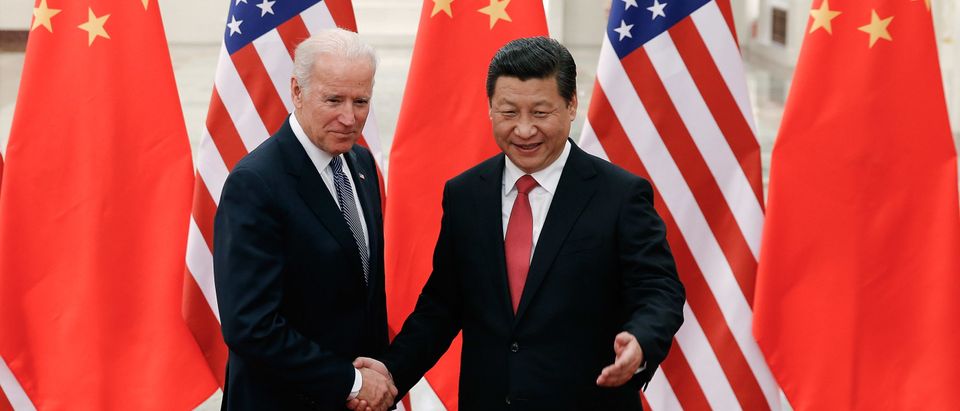The Biden White House has signaled that the president may lift many, if not all, of the tariffs imposed against China by former President Donald Trump. The rationale for Biden’s decision is to help American consumers by reducing today’s raging inflation.
The net effect is likely to be minimal: today’s supercharged inflation doesn’t result from our China trade but, rather, from years of profligate Federal Reserve monetary policy plus unsustainable fiscal policies by Republican and Democratic administrations, including Congress, that ballooned our national debt.
On July 7, 2022, the Wall Street Journal published three articles concerning China. Max Colchester’s front-page story announced that the “FBI Warns of China Tech Spies.” Page A2 featured a column by Greg Ip explaining that “Gridlock Hamstrings U.S. on China.” Meanwhile, on A17’s Opinion page, Maurice R. Greenberg, the Chairman and CEO of C.V. Starr & Co. and former AIG Chairman and CEO, presented a new group of CEOs and policy experts who “Want to Rebuild U.S.-China Relations.”
Talk about a disconnect!
China is the nation whose Communist Party dictatorship gave us the coronavirus that has now killed over six million people worldwide, including over a million Americans. Its leaders still refuse to come clean about China’s role when the virus first appeared in Wuhan.
If Joe Biden wants to know why his polling numbers are so low, he might want to begin by considering his feckless China policy.
Colchester reports that FBI Director Christopher Wray and Ken McCallum, head of MI5, Britain’s domestic counter-intelligence and security agency, jointly announced that “the Chinese government is set on stealing your technology — whatever it is that makes your industry tick — and using it to undercut your business.”
Director Wray added: “They’re set on using every tool at their disposal to do it.” The Chinese will deploy State-sponsored hacking, efforts to influence domestic policymaking, and use trade or investment “to reward or punish officials.” Wray emphasized that meeting this challenge is critical “if we are to protect our economies, our institutions and our democratic values.”
Mr. Colchester reports that “China’s government denies that it interferes in the affairs of other countries.” If you believe that claim, then you’ll also believe Vladimir Putin when he said that Russian troops didn’t invade Crimea in 2014.
Mr. Ip’s reporting examines Congress’ current difficulties in legislating a “China competition bill,” as well as the U.S. Innovation and Competition Act that would expand domestic semiconductor manufacturing and development, plus technology R&D, aimed at countering China’s long-term strategic goal of leading the world in these critical high-tech areas.
Ip further notes that “without any sign of … concessions, Mr. Biden plans to roll some [tariffs against Chinese goods] back as a gesture of concern for inflation, which is battering his popularity.” His article concludes by quoting Bill Bishop, author of the China newsletter “Sinocism,” who warns that Biden’s actions would “further confirm the view held by some in Beijing … that the U.S. does not have the stomach for ‘protracted war’” with China.
Mr. Greenberg, at age 97, has long had Chinese business interests. His Journal op-ed is all business, all the time. He mentions the hundreds of billions of dollars in bilateral U.S.-China trade annually and suggests that “business leaders from both countries can achieve positive outcomes despite their differences.” He wants to resurrect the bilateral exchange mechanisms that President Trump effectively halted when he imposed the tariffs.
Not once does Mr. Greenberg reference Chinese hacking, spying, human-rights violations, child-labor practices, intellectual-property theft, Hong Kong, or the pandemic. The “senior U.S. business and policy leaders” who support his plea for “a more constructive relationship with China” constitute a blue-chip group of globalization advocates.
Considered together, these three Wall Street Journal articles present an inconsistent, undisciplined U.S. approach to China.
President Biden now wants to reward China after more than a million Americans have died from the coronavirus.
Congress cannot act strategically to reposition the U.S. as a tech leader or to penalize China’s hacking and intellectual-property theft.
And, some American business leaders seem unaware that their current posture mirrors business views in 2001 when we supported China’s joining the World Trade Organization. WTO membership would ensure China’s entry into the global world economic order as a responsible trading partner. We now know how that mistaken assumption has played out.
We’ve learned no lessons and remain clueless when it comes to China. It’s no wonder that Beijing perceives America as weak. Under Joe Biden, we are.
Charles Kolb served as Deputy Assistant to the President for Domestic Policy from 1990-1992 in the George H.W. Bush Administration












